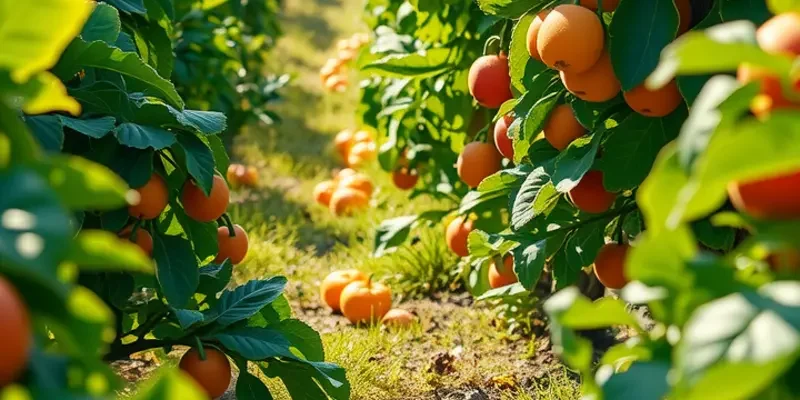Choosing meals that support land conservation is a practical way to align your diet with your environmental values. By making eco-friendly food choices, you contribute positively to the planet, encouraging biodiversity and protecting natural habitats. Each meal can be a step towards a healthier ecosystem, and understanding how to make these choices is vital for any environmentally-conscious individual. Let’s explore how meals can serve as powerful tools in conservation efforts.
The Power of Sustainable Ingredients

Choosing sustainable ingredients is a powerful step towards nurturing our planet. Let’s delve deeper into how specific choices in the food we consume can support land conservation and improve community health.
Local and Organic Produce
Eating locally sourced and organic produce significantly reduces the carbon footprint associated with long-distance transportation. These choices not only support small farmers but also promote soil health through reduced chemical usage. By selecting seasonal produce, we align our diets more closely with natural growing cycles, which reduces the need for artificial heating and lighting commonly used in greenhouses.
Impact on Biodiversity
Choosing indigenous crops fosters biodiversity. It helps maintain a broader variety of species and contributes to the robustness of ecosystems. This practice supports natural pest control and maintains genetic diversity, which is essential for adaptability to climatic changes or diseases.
Incorporating Plant-Based Options
Embracing plant-based meals is influential in reducing ecological footprints. Animal farming is resource-intensive, requiring vast amounts of water and land. By shifting towards vegetables, grains, and legumes, we minimize the toll on these resources. Plant proteins derived from beans, lentils, and quinoa offer a low-impact alternative to meat that satisfies nutritional needs without sacrificing taste or variety.
Community Health and Wellbeing
Local and organic foods often mean fresher produce with higher nutrient content, supporting better health outcomes. A plant-centered diet can reduce the risk of chronic illnesses. Moreover, supporting local farms enhances community resilience by keeping food systems sustainable and economies thriving.
Practical Implementation
To practically implement these concepts, consider visiting local farmers’ markets or joining a CSA (Community Supported Agriculture) program. These options bring fresh produce directly from farms to your table. For more foundational tips on integrating plant-based eating into your life, check out this guide to easy plant-based eating.
By thoughtfully incorporating sustainable ingredients, we take meaningful strides towards a healthier planet and community. Every conscious choice nurtures the earth, embodying the essence of eco-friendly living in each meal.
Eco-Conscious Meal Planning

Planning meals that honor the Earth involves more than just choosing the right ingredients. It’s about cultivating mindful habits that reflect a commitment to sustainability. One approach that supports land conservation is batch cooking. By preparing multiple servings at once, you reduce cooking times and energy consumption, leading to a smaller carbon footprint. Moreover, batch cooking ensures meals are on hand, helping to prevent last-minute takeout decisions that often involve less eco-friendly choices.
An essential aspect of eco-conscious meal planning is minimizing food waste. This can be achieved by adopting the ‘zero waste’ kitchen concept, which encourages the use of every part of an ingredient. For example, vegetable peels and tops can become part of a homemade stock. This reduces the amount of food discarded while also adding flavor and nutrients to your dishes. Furthermore, effective food storage solutions can extend the lifespan of leftovers, aiding in waste reduction. For practical tips on low-waste cooking and preparation strategies, consider reviewing some resources, such as safer storage of sauces, that provide detailed insights into sustainable practices.
When crafting your meal plans, emphasize plant-based dishes. Not only do these meals often require fewer natural resources, but they also promote biodiversity and soil health. Ensuring your diet is rich in plant-based foods can actively contribute to land conservation and reduce deforestation driven by animal agriculture.
Another critical element is taking advantage of seasonal ingredients. Seasonal produce is more likely to be locally sourced, which means it requires less transportation and fewer preservatives. Eating seasonally also supports local farmers and reduces the need for out-of-season imports. You can find out what’s in season by visiting local farmer’s markets or subscribing to a community-supported agriculture (CSA) box, which often includes a variety of fresh seasonal produce.
Lastly, avoiding processed foods is another pillar of an eco-conscious diet. Processed foods typically involve extensive packaging and transportation, increasing their environmental impact. Opt instead for whole foods that you can prepare from scratch, knowing exactly what goes into your meals.
Integrating these strategies not only nurtures the Earth but also enriches your palate. With a bit of planning and creativity, each meal becomes a step toward a more sustainable future, making a significant impact with every bite. By focusing on local resources and minimizing waste, you’re not just making healthier choices for yourself but also fostering a healthier planet.
Final words
Adopting meals that support land conservation requires commitment but offers rewarding benefits for both you and the planet. Your food choices can positively impact ecosystems by promoting sustainable agriculture and reducing environmental strain. By incorporating sustainable ingredients and mindful meal planning into your lifestyle, you actively participate in land conservation, reshaping the food landscape for future generations. Remember, every little change adds up, and through educated dietary choices, you are making a significant difference.








